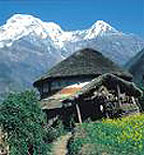
Whatever the agreements of the UN Conference on Climate
Change in Bali, the effects of global warming are being felt today.
In Nepal, for the past decade changes in precipitation patterns and shrinking
mountain glaciers have forced the impoverished of the western hills district to
move to the lowlands along the border with India, where 18% of the nation's
population lives. Today nearly half of the Nepalis live there resulting in
unease, upheaval and political tension.
Indonesia's forests are being burned to make way for palm plantations to meet
Europe's target to have 5.75% of its nations' vehicles run on biofuel by 2010,
making Indonesia the third largest emitter of greenhouse gases. Indonesia's
indigenous people need forests for their culture and livelihood. Communities
wanting to defend their land are in conflict with corporations.
Lagos, Nigeria, a city of 17 million people, is at the centre of an unstable
region on the coast. They have rising sea levels and a tide of villagers from
other areas displaced by the effects of global warming. There is a shortage of
basics like clean water, health care and education. Minimal government and
criminal gangs contribute to real dangers ahead.
Does it really matter? As the former Argentine climate negotiator, Raul Estrada-Oyuela,
said, “We are all adrift is the same boat – and there is no way half the boat is
going to sink.¨ What is happening “out there” can happen here within the
lifetime of many.
We can live in state of denial and panic, or become leaders of ourselves and
part of the human fraternity regardless of language, culture, sex or pigment. We
can transform fear, doubt and pessimism into courage, intelligence and faith, to
overcome whatever trial we have to face. It's a tall order but one that can
definitely be filled.